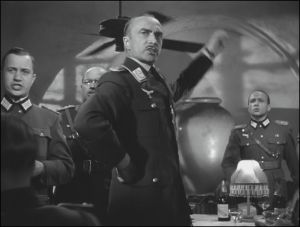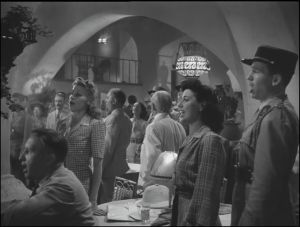Casablanca
Ally’s review originally published August 30th 2010.
Updated to include Rachel’s review on January 18th 2011.
—
152. Casablanca
Directed by Michael Curtiz
USA, 1942
IMDB | allmovie
Reviewed by Ally
Umpteenth viewing
Description:
Cynical American expatriate Rick Blaine (Humphrey Bogart) runs a nightclub in Casablanca. His clientele includes officials of the Nazi regime and stranded refugees trying to reach America, but he professes to be politically neutral and “sticks his neck out for nobody.” When Rick’s old flame Isla Lund (Ingrid Bergman) arrives in Casablanca with her husband, fugitive freedom fighter Victor Laszlo (Paul Henreid), they are each faced with difficult decisions. And maybe Rick isn’t so neutral…
Essential Scene:
Ilsa and Victor enter Rick’s Café Américain for the first time, expecting to meet the man who will sell them exit visas. All eyes are drawn to them. The club pianist, Rick’s loyal friend Sam (Dooley Wilson), recognizes Ilsa. He shakes his head forlornly, sensing trouble ahead.
Later, Sam brings his piano to Ilsa’s table at her request. They discuss old times, Sam apprehensively evading Ilsa’s questions about Rick. It’s still unclear exactly what has gone on between them. Ilsa requests a song that Sam is clearly reluctant to play.
Ilsa: Play it once, Sam. For old times’ sake.
Sam: I don’t know what you mean, Miss Isla.
Ilsa: Play it, Sam. Play “As Time Goes By.”
Sam: Oh I can’t remember it, Miss Ilsa. I’m a little rusty on it.
Ilsa: I’ll hum it for you. (She hums the tune.)
(Sam begins to play it.)
Ilsa: Sing it, Sam.
Sam: (singing)
You must remember this
A kiss is just a kiss
A sigh is just a sigh
The fundamental things apply
As time goes byAnd when two lovers woo
They still say I love you
On that you can rely
No matter what the future brings
As time goes by
Rick rushes out of his office upon hearing the song. “Sam, I thought I told you never to play…” He stops dead when he sees Ilsa. We begin to sense what they meant to each other.
Thoughts:
It’s hard work reviewing Casablanca. It’s so ingrained in popular culture, so closely examined, that there surely can’t be anything left to say about it. Bogart is great. Bergman is unspeakably beautiful. I’m always happy to see (and hear) Peter Lorre, however briefly. Dooley Wilson’s rendition of “As Time Goes By” gives me shivers whenever I hear it. So does the iconic “if that plane leaves and you’re not on it” speech. The exit visa MacGuffin doesn’t really make sense, but nobody seems to mind.
Forget it, Ally. It’s Casablanca.
—
Reviewed by Rachel
First viewing
Essential Scene:
The Nazi soldiers sit in a corner of the bar, very loudly singing the German anthem, “Die Wacht Am Rhein.”
Victor Laszlo (Paul Henreid) defiantly walks over to the orchestra and tells them to play the French national anthem, “La Marseillaise.” They hesitate until Rick (Humphrey Bogart) nods his approval. The band strikes up and Laszlo starts to sing. Before long, the entire bar is upstanding and singing too.
Major Strasser (Conrad Veidt) tries his best to keep his soldiers singing the loudest but the Nazis soon give up, and sit down quietly. Tears and smiles alternately form as the anthem continues, and eventually finishes to cheers and cries of “Vive la France!”
Thoughts:
Ilsa: I wasn’t sure you were the same. Let’s see, the last time we met…
Rick: Was La Belle Aurore.
Ilsa: How nice, you remembered. But of course, that was the day the Germans marched into Paris.
Rick: Not an easy day to forget.
Ilsa: No.
Rick: I remember every detail. The Germans wore grey, you wore blue.
My name is Rachel and this is my first viewing of Casablanca. Now, for those of you who haven’t already disowned me, here are my thoughts…
Call me unsentimental [“Hello, Unsentimental.” ~ Ally] but the romance wasn’t the thing that impressed me most about Casablanca. It was beautiful, of course, well written and well acted. But ultimately, what most intrigued me was how the film dealt with wartime.
Rick’s Café was representative of Europe, and countries under the watchful eye of the Nazis. It housed foreigners who were lucky enough to be able to escape to America, and the others who were desperate to go. It showcased the rebels such as Laszlo, the corrupt officials such as Renault, and the spirit of the people — the general crowd, kept alive by Sam’s music. The Nazi soldiers, strikingly obvious in their uniforms, walked in and out of the bar, their presence as stifling as the spotlight in the tower outside that kept an eye on all comings and goings.
The atmosphere in the smoky bar is brilliantly paralleled by flashback scenes showing Rick and Ilsa in Paris during the invasion. After viewing the City of Love covered in tanks and German-spouting loudspeakers, the paranoia grows in the bar scenes. We have seen exactly what the inhabitants of Rick’s “joint” are hiding from, and seeing the Nazi soldiers enter the room is a painful reminder.
Ironically, many aspects of the film are now seen to be historically inaccurate, despite it being filmed and released during the war. I don’t think it matters, though. Casablanca represents the struggle, rather than depiction of fact.
—
Fascinating fact: Conrad Veidt, who played Major Strasser, was in life a staunch anti-Nazi.





Round up the usual suspects.
The Usual Suspects is on the list, yes?
Nice job, you’re right it’s a tough task to review something so iconic.
The Usual Suspects is indeed on the list – number 901 to be precise. Looking forward to spoiling that for the 2 or 3 people in the world who don’t yet know how it ends…
Glad you enjoyed your first viewing of it – I wish I could go back and watch it again through fresh eyes but, like Ally, I’ve seen it too many times to mention.
You picked out my favourite scene with the national anthems – that’s the moment my lip starts to wobble, and I almost wish I was French ;-)
I’m the same, I get a proud feeling of patriotism and then I realise it’s not even my country!
I guess the power of it is that it feels as though it’s for everyone fighting the Nazi regime, despite it being the anthem of one country.
Glad you finally saw this bit of cultural history. Yes, it’s a love story within a bigger story, the story of world war. Rick & Ilsa are the hero and heroine of the first, Victor and Ilsa of the second. The two stories come together twice, really. First, in the scene in the bar where Victor offfers up his love of a lifetime, Ilsa, to let her get safely away, and then at the end of the movie where Rick copies him, sacrificing his love of a lifetime to let her get safely away to Lisbon. Lots of noble sacrifice in this movie (by Victor, Ilsa, and the Bulgarian bride) and at the end Rick gets on board. Do we give him too much credit? As a feminist I find him horribly patronizing, as he enjoys playing back all that nobility to poor Ilsa. Is he even aware that the world war story really hasn’t undone his love story, but his restless nature has? Ilsa has made him feel like the winner of the love story, so he can move on, under the guise of generosity. Meanwhile Victor is a man of the world who isn’t about to argue. “This time, I know our side will win.” “I understand.” Time to beat it out of there, and Victor does, taking Ilsa with him. Their love story, and the story of world war, goes on, taking us with them.